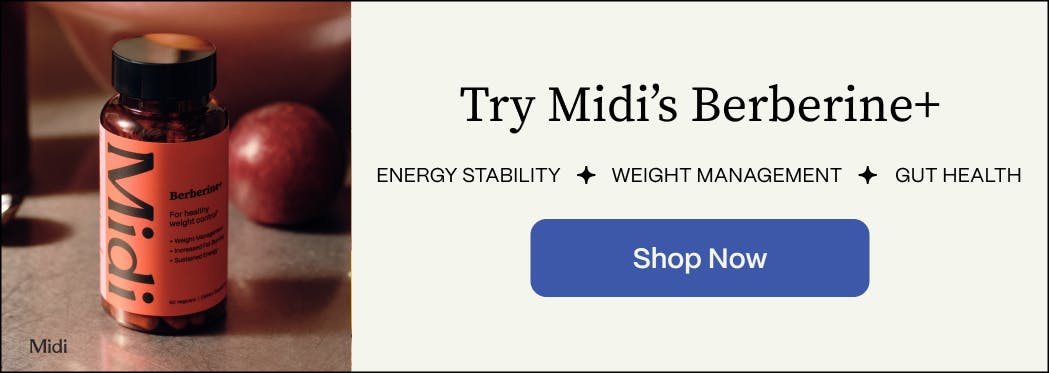If you’re feeling frustrated by stubborn weight gain or a body that seems as if it literally changed shape overnight, you may be interested in what weight loss supplements could do for you. The reality is that there’s a lot of hype out there and splashy products that come with big claims about results. We dug into the science to find the best weight loss supplements for women, what you can really expect from them, and how they fit into an overall plan.
Among the many frustrating symptoms of menopause, there’s one that everyone says to prepare yourself for: weight gain. Research shows that during the menopausal transition, fat gain increases, muscle mass decreases, and we commonly experience body composition changes. Mainly: Fat tends to migrate from your butt and thighs to the belly area (there's a reason it's called "meno belly").
If you’re here, you’re likely concerned with what’s happening and looking to stall weight gain (or maybe even lose weight) to regain the body that you once recognized. If diet and exercise no longer move the needle like they once did, you may be curious about weight loss supplements and whether they can get the excess weight to budge.
The reality is that supplements aren’t a magic bullet, but they can support weight loss even though they don't lead to significant reductions on their own. And they may help promote healthy appetite, metabolism, and blood sugar levels, which can all play a supportive role in your goals. So, what is the best supplement for weight loss for women? Consider this your no-bs guide.
What to Look for in a Weight Loss Supplement
Weight loss supplements can promise a lot, but there’s often not a ton of evidence to back up those claims. When you’re looking for a weight loss supplement, follow these guidelines to separate the real from the ho-hum:
- Scientific backing: Ingredients in the supplement should have clinical research behind them that show they support weight loss.
- Transparency: The label should clearly spell out exactly what’s in the supplement, including active and inactive ingredients.
- Safety: Buy from companies that use independent third-party testing, which verifies the accuracy of the product label and ensures there’s nothing in it (like undisclosed weight loss drugs) that you don’t want.
6 Evidence-Based Supplements for Weight Loss in Women
Some supplements can give you an edge in weight loss. However—and this is huge—weight loss is about energy balance. That is, consuming fewer calories than your body burns throughout the day. That’s not so easy to predict, since many things, from activity level to metabolism, appetite, and going to the bathroom, all factor into energy balance. Using supplements can be part of that equation, as some might decrease appetite or keep you regular, while others might increase your resting metabolism slightly.
Here, six of the top weight loss supplements:
Fiber
Fiber is plentiful in fruits, veggies, whole grains, legumes, nuts, and seeds. But most of us are missing the mark on this nutrient. Increasing intake of fiber via food has been found to help people lose weight. (Besides, eating more quality carbohydrates may help ease symptoms of menopause in the ultimate win-win.) Numerous fiber supplements exist in the market—including Midi’s own, Daily Fiber+, which contains both soluble and insoluble fiber, as well as chromium picolinate to help reduce sugar cravings.
Fiber itself stimulates appetite-suppressing and gut hormones to increase satiety, improves blood lipid levels, and reduces blood sugar response. Once digested, fiber goes through a fermentation process in the gut that creates substances like short-chain fatty acids that impact appetite, blood sugar control, and body weight. In a research review including adults in 12 randomized-controlled trials who were overweight or had obesity, taking a soluble fiber supplement (psyllium husk is one example) for 2 to 17 weeks was associated with about a 5.5-pound weight loss, compared with a placebo. Other research in the journal Nutrients has come to a similar conclusion, finding that people who are genetically susceptible to obesity lost more weight, fat, and visceral fat by taking supplements like psyllium or inulin over 180 days, compared with a placebo group.
Green Tea Extract (EGCG)
In one study from China, women who had been long-term, regular green tea drinkers (we’re talking 1 cup six days per week for 20 years) had lower body mass index (BMI), insomnia, and depression—and higher estrogen levels than those who consumed the brew less regularly. Antioxidants in green tea, such as EGCG, may reduce inflammation, improve gut microbiome health, and have a beneficial effect on hormones.
If you prefer not to brew, you can also purchase green tea supplements. The impact on weight isn’t large, but taking 1,000 milligrams (mg) per day for at least 8 weeks has been shown to lead to small benefits, losing about an extra two to three pounds versus controls.
While drinking green tea is safe, the extract has been linked to liver injury, so it’s best to chat with your clinician first to see whether it’s safe to include in your weight loss plan.
Protein Powder
Given you can buy protein chips, water, and salad greens, protein is having a moment for weight loss. Muscle mass loss is a real concern as you age, and protein intake helps you build and maintain muscle. What’s more, muscle mass affects your metabolism. That’s why making sure you get ample muscle-building protein during perimenopause and postmenopause is key.
Also interesting? There is a theory called the protein leverage effect. It says that as you lose protein through things like muscle loss, your body starts to crave more protein to make up for it. That’d be great, if suddenly you were swooning for baked chicken breasts. Unfortunately, we may then overeat non-protein-rich foods in an effort to make up for these protein losses, leading to weight gain.
All this means that protein powders can be a great add-in to your diet to boost your protein intake. (Look for protein powders like whey or pea protein that do not have added sugar.) One catch: Protein plus strength-training exercise tends to be the secret sauce for retaining muscle mass and strength, so make sure you’re combining the two for the most benefits.
Probiotics
Probiotics are bacteria that promote gut health found in fermented foods like kombucha, yogurt, kefir, kimchi, and supplements. Evidence is mixed, but some data find that probiotics may be associated with reduced body weight and waist circumference—plus, during the menopause transition, supplementation may also help reduce symptoms like hot flashes and mood changes that can make sticking to healthy habits more challenging.
Conjugated Linoleic Acid (CLA)
CLA is a fatty acid found in red meat and dairy, and it’s been suspected to have anti-obesity potential for nearly 30 years. Researchers suspect that CLA might have appetite-suppressing and metabolism-boosting effects, though that’s still being investigated. In one meta-analysis of eight trials, women who supplemented with CLA for at least 6 weeks lost about 2.5 pounds. CLA was found to be particularly effective for certain groups, namely in women who were overweight or had obesity or were postmenopausal.
Berberine
Berberine, which has been dubbed “nature’s Ozempic,” is a plant-based substance that may have some weight loss potential, possibly due to promoting genes that block fat cell development, increase metabolism, and promote healthy insulin function. A research review suggests that taking at least 1 gram of berberine per day for more than 8 weeks may lead to decreases in BMI and body weight, per the National Center for Complementary and Integrative Health. One issue is that there is no standard berberine formula, so it’s hard to know what supplement will be beneficial—plus, like GLP-1s, berberine can still cause GI side effects like nausea, bloating, and abdominal pain.
Popular Supplements That Need More Evidence
Some supplements have a lot of weight loss buzz around them, but not much science . Here are a few that people have been watching, but are probably not worth it until we have more evidence:
- Apple cider vinegar: In 2024, a small clinical trial on young people suggested that daily apple cider vinegar could help reduce BMI due to appetite-suppressant effects. Unfortunately, that study has been retracted for poor data and analysis.
- Raspberry ketones: Research is conflicting, much of it done on rodents, and some of it done in conjunction with healthy exercise and diet, which can independently lead to weight loss. Skip this one.
- Garcinia cambogia: This tropical fruit contains a compound called hydroxycitric acid, which is believed to affect levels of leptin, a main appetite hormone. And while that may be the case, we just don’t have enough research or high-quality research to know for sure. This one is a wait and see.
Are Vitamins Necessary for Weight Loss?
As for vitamins for weight loss for women, a well-rounded diet is integral for staying healthy while losing weight. Some nutrients are associated with weight loss directly or indirectly. Here’s what to know about three of them:
- Vitamin D: Low levels are associated with obesity, but supplementation hasn’t been shown to cause weight loss. (That said, losing weight tends to increase vitamin D levels in the body.)
- B vitamins: These play a role in food breakdown and energy metabolism in the body. Some preliminary research suggests that some B vitamins (but not all) are associated with weight loss. Focusing on a healthy diet that includes various B vitamins—fish, poultry, meat, eggs, dairy, leafy greens, beans, peas, and fortified cereals and breads—will get you what you need.
- Magnesium: The mineral may support sleep and mood regulation, indirectly aiding weight management. After all, sleep impacts appetite regulation, and mood is a big reason why we emotionally eat.
Weight Loss Supplements vs. Prescription Medications
Prescription weight loss medications, such as semaglutide or tirzepatide, are FDA-approved for weight loss. That means they went through rigorous trials to determine dosage and populations who would most benefit, as well as identify potential side effects. Most supplements, on the other hand, are available over the counter, and there are various brands to choose from. The category overall has less oversight and regulation.
If you are interested in using a supplement, talk with a healthcare professional, like a Midi clinician, first. They can answer your questions about whether a personalized GLP-1 medication or supplement is right for you based on your health, lifestyle habits, and weight loss goals. What’s more, a supplement doesn’t take the place of diet, exercise, sleep, and stress management—all things that are needed to make weight loss happen—so having a clinician by your side can help you create a well-rounded plan that sets you up for success during the menopausal transition.
Weight Loss Success Stories
Safety Tips for Choosing Weight Loss Supplements
After getting the go-ahead from your clinician, choose a supplement that has independent third-party certification, such as through USP or NSF. These ensure label accuracy, so you’ll get the ingredients you expect—but nothing (heavy metals, banned weight loss drugs) that you obviously don’t.
Supplements that feature unrealistic claims should also be avoided. The reality is that one supplement cannot and will not be the answer to weight loss or reducing belly fat. Losing weight takes lifestyle changes and adjustments, and a supplement may be able to support your goals—but it can’t do it alone.
When to Talk to a Healthcare Professional
If you are stressed out about weight gain or have metabolic symptoms—high blood sugar, excess abdominal fat, unhealthy lipid levels—talk with a healthcare professional about your weight. But make sure that the clinician is one you trust, who’s educated in weight loss (rather than giving unhelpful blanket statements like “lose weight” or “eat less and move more”) and will look at you as an individual.
Even though a supplement isn’t the only thing you need in a weight loss plan—that’s OK. Here’s why: Having a clinician in your corner, like one at Midi Health, who knows how to personalize a weight loss plan that includes supplements or weight loss medications will help you achieve a weight that’s healthy for you and that you can maintain in the long term.
Key Takeaways
- While taking supplements won't lead to significant weight loss, some may support your goals by decreasing appetite or keeping you regular, while others might increase your resting metabolism slightly.
- When it comes to weight loss supplements, focus on nutrients that are already the cornerstones of a healthy, balanced diet, like fiber and protein. Get as much as you can from food and supplement to fill gaps.
- Some supplements, like berberine and certain probiotics, may also play a role in regulating systems that help promote weight loss.
- Trending products, like apple cider vinegar, raspberry ketones, and garcinia cambogia, are lacking in research, so they may not be worth it for weight loss until there's more evidence.
Frequently Asked Questions (FAQs)
Which weight loss pill is most effective?
There isn’t a specific weight loss supplement that helps everyone lose weight. Two to consider are fiber and protein, both of which help with appetite and satiety. However, you should still aim to get most of your fiber and protein through healthy food sources.
Which supplement is best for losing weight?
When it comes to the best supplement for supporting weight loss, keep in mind that supplements can be part of a personalized weight loss plan. Those might include berberine, protein, fiber, probiotics, and/or green tea. That said, for success, any supplement you take needs to be combined with lifestyle changes, such as calorie reduction through a healthy, balanced diet; exercise like resistance training to maintain muscle mass; and adequate sleep to keep hunger hormones even.
What is the best fat burner supplement for women?
Fat burner supplements aren’t reliable for fat and weight loss. Some supplements like green tea, caffeine, and protein may help promote healthy weight and fat loss, but they have very mild effects and won’t work unless you change your diet and exercise habits as well.
What burns fat the fastest for women?
Fat burner supplements haven’t been shown to be all that effective. However, resistance training (such as with weights or your own body weight) is an effective fat burner, as it’s been shown to reduce overall body fat and visceral fat.
If you’re in perimenopause or menopause and want guidance from clinicians who specialize in women’s midlife health, book a virtual visit with Midi today.
Hormonal change is at the root of dozens of symptoms women experience in the years before and after their period stops.
Our trained menopause specialists can help you connect the dots to guide you towards safe, effective solutions.
Whether you need personalized guidance or a prescription routine to tackle symptoms—including vaginal dryness and irritation, brain fog, hot flashes, sleep trouble, mood swings, and weight gain—we’ve got you covered.
Midi’s mission is to revolutionize healthcare for women at midlife, wherever they live and whatever their health story. We believe that starts with education, to help all of us understand our always-changing bodies and health needs. Our core values guide everything we do, including standards that ensure the quality and trustworthiness of our content and editorial processes. We’re committed to providing information that is up-to-date, accurate, and relies on evidence-based research and peer-reviewed journals. For more details on our editorial process, see here.

 Claudia Levine, MD
Claudia Levine, MD






